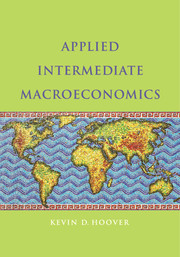Book contents
- Frontmatter
- Brief Contents
- Contents
- Acknowledgments
- To the Student
- To the Teacher
- Part I Introduction
- Part II The National Accounts
- Part III Trends and Cycles
- Part IV Financial Markets
- 6 The Financial System
- 7 The Behavior of Interest Rates
- 8 The International Financial System and the Balance of Payments
- Part V Aggregate Supply
- Part VI Aggregate Demand
- Part VII Macroeconomic Dynamics
- Part VIII Macroeconomic Policy
- Part IX Macroeconomic Data
- Symbols
- Glossary
- Guide to Online Resources
- Index
6 - The Financial System
from Part IV - Financial Markets
Published online by Cambridge University Press: 05 June 2012
- Frontmatter
- Brief Contents
- Contents
- Acknowledgments
- To the Student
- To the Teacher
- Part I Introduction
- Part II The National Accounts
- Part III Trends and Cycles
- Part IV Financial Markets
- 6 The Financial System
- 7 The Behavior of Interest Rates
- 8 The International Financial System and the Balance of Payments
- Part V Aggregate Supply
- Part VI Aggregate Demand
- Part VII Macroeconomic Dynamics
- Part VIII Macroeconomic Policy
- Part IX Macroeconomic Data
- Symbols
- Glossary
- Guide to Online Resources
- Index
Summary
Money, which represents the prose of life, and which is hardly spoken of in parlors without an apology, is, in its effects and laws, as beautiful as roses.
Ralph Waldo EmersonThe first thing that comes to mind when most people think about the economy (or economics) is money: whence it comes, whither it goes. Probably no aspect of macroeconomics is more in the news than the financial system. We are deluged with daily reports of the state of the stock market, endless analyses of the Federal Reserve's monetary policy, speculations about expansions and consolidations among giant financial corporations, and stories about the financial solvency of foreign and local governments or industrial corporations. In this chapter, we examine the financial system's role in coordinating economic decisions and linking aggregate supply and aggregate demand. In the next chapter, we concentrate on the behavior of interest rates.
The Role of Money and Finance
Money and financial assets are not direct sources of economic welfare. We cannot eat them or build houses with them. The Scottish economist/philosopher/historian David Hume (1711–1776) wrote that money “is none of the wheels of trade: It is the oil which renders the motion of the wheels more smooth and easy.” We do not value a car for its lubrication system; we do not value an economy for its financial system. The financial system is important only because it affects the things that do govern our welfare: whether or not we have a job; how much we can consume now or in the future; how our government is financed; and the part that our country plays in the world. The lubrication system makes the complex parts of the car function smoothly; the financial system simplifies consumption and production. The financial system is essential if complicated economic relationships are to be feasible. An economy without a financial system could hardly be more than a small village. Just as we often drive with no regard to lubrication, we conduct our daily economic transactions giving little thought to the financial system. But too little oil or a broken oil pump can bring the car to a standstill; and financial disorders can push an economy into a slump.
- Type
- Chapter
- Information
- Applied Intermediate Macroeconomics , pp. 167 - 213Publisher: Cambridge University PressPrint publication year: 2011



